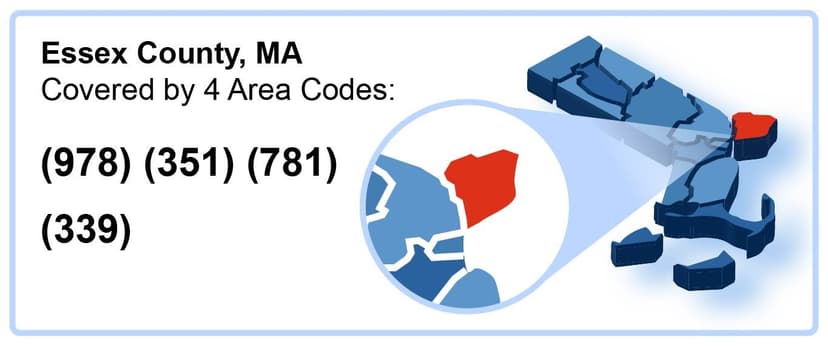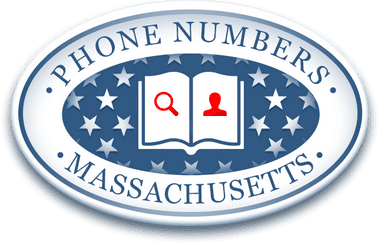What are Essex County Area Codes?

Essex County area codes are the first three-digit numbers at the beginning of all phone numbers issued in the county. Area codes are assigned according to the North American Numbering Plan (NANP), and they distinguish different Numbering Plan Areas (NPAs) in the states. There are currently four active area codes serving Essex County. These are:
Area Code 978
Area code 978 was created in 1997 from a split of the 508 NPA. It is a Massachusetts telephone code covering Essex County and parts of other Massachusetts counties. Places in Essex County within area code 978 include Andover, Lawrence, Haverhill, Beverly, Middleton, Newbury, Salem, and South Hamilton.
Area Code 351
Area code 351 is a Massachusetts telephone area code in the NANP. It was created in 2001 as an overlay for the 978 NPA and covered the same places.
Area Code 781
A split from the 617 NPA in 1997, area code 781 covers Essex County and parts of a few other Massachusetts counties. The locations served by the 781 area code in Essex County include Lynn, Saugus, Nahant, Swampscott, and Marblehead.
Area Code 339
Area code 339 overlays the 781 NPA. Created in 2001, it serves all the places covered by area code 781.
The Massachusetts Department of Telecommunications and Cable (DTC) manages the state's telecommunications and cable industries. It is responsible for area code administration in the Commonwealth of Massachusetts.
What are the Best Cell Phone Plans in Essex County?
The four major phone carriers in the United States provide network coverage for the cities, towns, and villages of Essex County. While services are reliable in the cities and major towns, they tend to be less so in villages and rural settlements. Some of the villages do not receive any network coverage. In Lynn, Sprint offers the best coverage of about 88% ahead of T-Mobile, which covers 86% of the city. Verizon covers 80% while AT&T provides the least coverage at 76%.
As of 2018, only about 6.5% of Massachusetts’ adult population solely used landline phones for telecommunication. A CDC survey taken in 2018 reported this figure and also revealed that an estimated 39.9% of that demographic chose wireless-only telephony services as their telecommunication preference. A similar trend was also noted for the children in the Bay State for that year. This report implied that residents had increasingly adopted wireless telephony services as their preferred choice of telecommunication.
Essex County residents can make voice and video calls with Voice over Internet Protocol (VoIP). The service offers better user experience and more features than other traditional telephone services. VoIP transmits audio and video signals as data over broadband internet connections, facilitating real-time communication at more affordable rates.
What are Essex County Phone Scams?
Essex County phone scams are frauds that con artists commit to dispossess county residents of money and personal information using telephone services. Scammers take advantage of every opportunity to defraud unsuspecting targets and even spoof Caller IDs to impersonate government agencies and legitimate organizations. Running suspicious phone numbers through reverse phone lookup services can reveal information on the registrants’ real identities.
Essex County phone scams can be reported online to the Massachusetts Office of Consumer Affairs and Business Regulation (OCABR). Also, residents who believe they may have been scammed can report to the Massachusetts Office of the Attorney General (MOAG) on (617) 727-8400. The most common phone scams in Essex County include:
What are Grandparent Scams?
The Essex County Sheriff's Department (ECSD) warns elderly residents to be wary of scammers pretending to be relatives and soliciting money over the phone. Most of these scammers glean their targets' information from various social media accounts and use these details when contacting them. They claim that their targets' grandchildren are in emergencies and need their aid to remedy the situations. In some instances, the scammers will pose as the grandchildren while at other times, they claim to be the grandchildren's doctors or lawyers. If the targets request to speak with their grandchildren, they come up with excuses to avoid being exposed and may attribute the inability to chat clearly to lousy network reception.
The scammers ask their targets to wire money immediately to help their loved ones and instruct them to keep the calls secret from other relatives. If you receive this type of call, remain calm, and do not rush out to send money. Try and reach out to other relatives or directly to the grandchild in question to verify the caller’s claim. Essex County residents who may have fallen victim to this scam can file their complaints with the ECSD by calling (978) 750-1900.
What are IRS Scams?
The Internal Revenue Service (IRS) scam perpetrators impersonate law enforcement officials or IRS agents. Essex County residents can use reverse number lookups to retrieve information about the phone numbers used for IRS scams. The scammers will inform their targets that they have overdue tax balances that they must pay off immediately. They often threaten arrest and prosecution if their targets seem unwilling to pay. They ask for payments through wire transfers and sometimes request the targets’ credit/debit card information to collect payments. These scammers spoof the IRS and law enforcement agencies' Caller IDs in many instances, making it look like their calls are legitimately from these agencies. Several reported incidents confirmed that the scammers also request personal information such as the targets’ dates of birth, SSNs, and PINs.
The IRS warns that it does not initiate phone calls with taxpayers unless requested by them. The IRS also urges residents never to disclose personal information or pay money to unknown solicitors over the phone. The IRS does not threaten taxpayers or request payment over phone calls. Persons who receive this type of call or have been scammed can report to the FTC online or file complaints with the TIGTA.
What are Lottery Scams?
Persons who live in Essex County and have fallen victim to lottery scams can file reports with the Attorney General’s Office by calling (617) 727-8400. They can also register their complaints with the OCABR or call the Essex County Sheriff's Department on (978) 750-1900.
Lottery fraudsters impersonate lottery agents and inform their targets that they won the lottery. However, victims must pay taxes and processing fees upfront via prepaid cards or wire transfers to receive their prizes. It is important to emphasize that anyone who calls you with this type of claim is a scammer. You will not be personally notified if you won a lottery, especially not over the phone. You will have to go forward and claim your winnings with your winning ticket. Some residents who have received this type of call confirmed they did not enter the lotteries the callers claimed they won.
Persons who think they may have fallen for lottery scams can report them to the FTC by calling 1 (888) 382-1222. If you have participated in a lottery, and receive this type of call, verify the caller's claim by contacting the Massachusetts State Lottery. Running the caller's contact number through applications that offer suspicious phone number lookup services can help you identify who called.
What are Utility Scams?
If you are contacted by someone who claims to represent a utility company and is asking you to pay utility bills, hang up. Do not pay money or divulge personal information to such callers. Reach out to your utility company directly and verify the callers’ claims. The scammers will claim that you have unpaid bills and will attempt to coerce you into immediate payment over the phone. They will typically request that you provide your debit/credit card information to make such payment. If you try to resist their pressure, the scammers will either threaten to have you arrested or warn that service will be cut off imminently.
Essex County residents should be aware that utility companies will not ask them to pay bills via such unusual channels. They will also not initiate requests for payments over the phone or threaten them to obtain compliance. Utility scams in Essex County can be reported to the Massachusetts Office of the Attorney General by calling (617) 727-8400. Persons who have been scammed this way can also file online complaints with the DTC.
What are Robocalls and Spam Calls?
Robocalls are used by phone scammers to steal money and sensitive information from unsuspecting targets. They are auto-dialed phone calls that deliver pre-recorded messages to pre-selected phone numbers. The FTC provides information on how to stop unwanted calls on its website. Essex County residents can determine if a robocall is fraudulent or not by using reverse phone lookup search engines. The following tips will help you avoid getting scammed by a robocall that comes through your phone:
- Hang up the phone once you confirm it is a robocall. If you press any key as may be prompted, you risk receiving repeated robocalls.
- Register your phone number on Massachusetts Do Not Call List and the National DNC Registry to stop receiving unsolicited phone calls. Doing this will stop robocalls from legitimate telemarketers. Any unwanted robocall that comes through your phone after registrations is a possible scam.
- Use the call-blocking features on cell phones to block robocall numbers. Contact your carrier and ask them to bar the number from calling in the future.
- Report robocall numbers to the FTC online or by calling 1 (888) 382-1222.
How Can You Spot and Report Essex County Phone Scams?
Protecting Essex County residents from falling victim to phone scams is a responsibility shouldered by the numerous consumer protection agencies. However, residents must make conscious efforts to avoid being scammed. These efforts include staying updated on scam alerts provided by these agencies and being able to spot scams when taking calls from unknown persons. The warning signs of phone scams in Essex County include:
- Scammers demand immediate payments and always by untraceable means such as bitcoins, prepaid cards, and wire transfers.
- Scammers usually get angry and hostile when they observe that their targets are not acceding to their demands.
- Scammers employ high-pressure tactics to obtain payments or their targets' personal information. They try to convince targets that their lucrative offers will be missed if payments are delayed.
- Scammers pose as employees of government agencies and threaten arrest or deportation to obtain money or confidential information from unsuspecting residents. Legitimate government representatives will never threaten residents with punitive actions to get them to comply with their demands.
- A caller requesting that you make an upfront payment to receive lottery winnings is a scammer. Lottery agents will not contact you even if you win. Besides, you do not have to pay for products or services that are advertised as free.
Essex County residents who receive scam calls or have been scammed can file complaints with these government agencies:
Massachusetts Office of the Attorney General - Essex County residents who fall victim to phone scams can file complaints with the MOAG by calling (617) 727-8400.
Massachusetts Office of Consumer Affairs and Business Regulation - The OCABR protects residents against phone scams by educating them on avoiding scams. Persons who think they have been scammed can report to the OCABR by calling (617) 973-8787 or online.
Essex County Sheriff's Department - Cases of Essex County phone scams can be reported to the ECSD by calling (978) 750-1900. The Department periodically releases scam alerts along with the news published on its website to educate residents. Residents can visit the Sheriff’s Department at 20 Manning Avenue, Middleton, MA 01949.
Federal Trade Commission - The FTC developed the DNC Registry to combat unwanted telephone solicitations. Essex County residents can enroll their numbers in the registry for free to stop unwanted calls. Registered residents who receive unsolicited calls 31 days after registration can file complaints with the FTC. Victims of robocall scams and other phone scams victims can file reports with the FTC by calling 1 (888) 382-1222.
